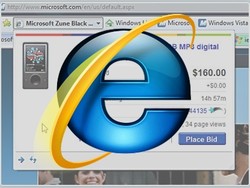Exclusive interview: Microsoft talks IE8
The complete Internet Explorer discussion

TR: Has the default of IE8 moved on to people's privacy rather than actively sharing information? Do you need to switch on the privacy functionality?
JC: It is still a discrete decision, which it has been all along. What we wanted to do was to strike the right balance between usability as well as functionality. For a lot of people there's tremendous benefit that they get by sharing some of their identity; the ability to come onto a website that instantly recognises the user and see customisable content accordingly.
For most users in the majority of their browsing sessions it's a more valuable state to be in than it is to switch over to inPrivate, so it's a question of where you want to default people into. So we made the decision based on empirical evidence and people studies we have made.
TR: How do you go about setting those privacy defaults? Microsoft is a company that has both software and an advertising business as well, so surely that creates a desire to not do something that would hurt that revenue stream?
JC: From a Microsoft perspective, our view is that we want to put the consumer at the centre of the equation and we want to optimise round them.
We do have an ad business; it's a successful business and we'll continue to develop it. But that said, we also have an obligation to customers and it's that which is important.
One of things we've done a great job on is to really highlight and make transparent the conversation that people are having. We don't take a view that a person knowing who you are is either good or bad, that's down to the person themselves to decide. What we want to do is make it obvious who they are engaged with – who's privy to this conversation they are having.
Get daily insight, inspiration and deals in your inbox
Sign up for breaking news, reviews, opinion, top tech deals, and more.
You should be empowered to make a decision on whether that conversation gets shared or not. If that sharing adds value to you and you want to [do it], then that's great. If you don't want it shared because, for instance, you are going to a medical site and you want to keep that private, then you should be empowered to make that decision.
Patrick Goss is the ex-Editor in Chief of TechRadar. Patrick was a passionate and experienced journalist, and he has been lucky enough to work on some of the finest online properties on the planet, building audiences everywhere and establishing himself at the forefront of digital content. After a long stint as the boss at TechRadar, Patrick has now moved on to a role with Apple, where he is the Managing Editor for the App Store in the UK.
